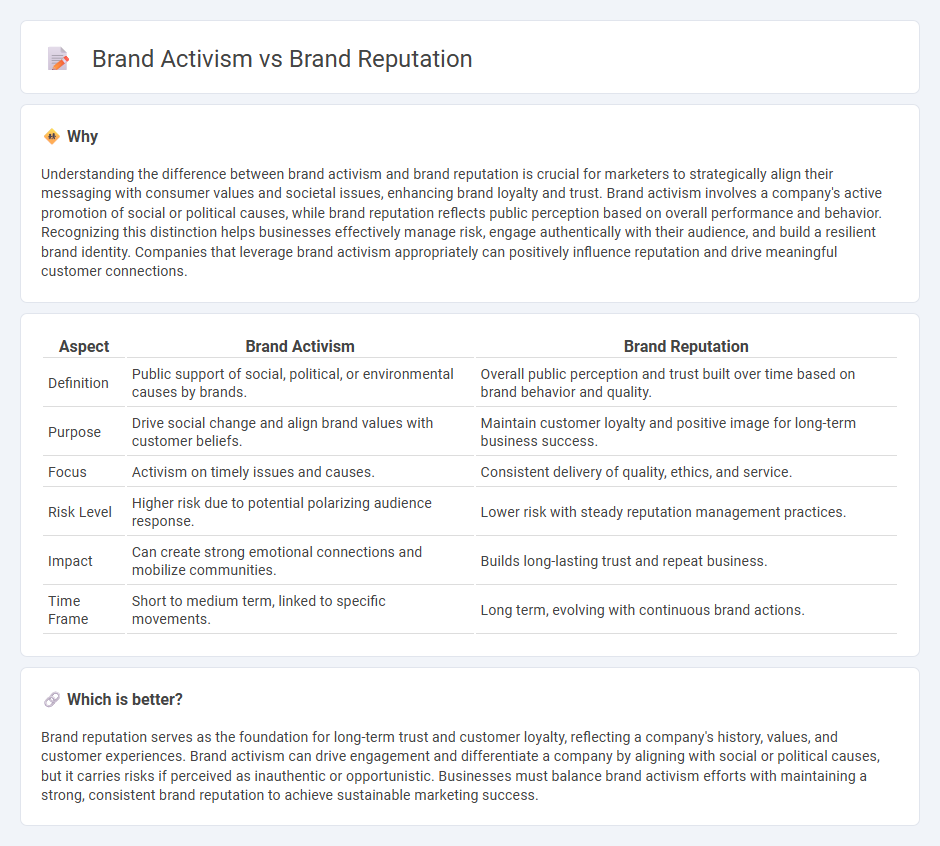
Brand activism involves companies taking a stand on social, political, or environmental issues to align with consumer values and drive social change. Brand reputation focuses on building and maintaining trust, reliability, and positive perceptions among customers through consistent quality and ethical practices. Explore how these two powerful marketing strategies intersect and impact consumer loyalty.
Why it is important
Understanding the difference between brand activism and brand reputation is crucial for marketers to strategically align their messaging with consumer values and societal issues, enhancing brand loyalty and trust. Brand activism involves a company's active promotion of social or political causes, while brand reputation reflects public perception based on overall performance and behavior. Recognizing this distinction helps businesses effectively manage risk, engage authentically with their audience, and build a resilient brand identity. Companies that leverage brand activism appropriately can positively influence reputation and drive meaningful customer connections.
Comparison Table
| Aspect | Brand Activism | Brand Reputation |
|---|---|---|
| Definition | Public support of social, political, or environmental causes by brands. | Overall public perception and trust built over time based on brand behavior and quality. |
| Purpose | Drive social change and align brand values with customer beliefs. | Maintain customer loyalty and positive image for long-term business success. |
| Focus | Activism on timely issues and causes. | Consistent delivery of quality, ethics, and service. |
| Risk Level | Higher risk due to potential polarizing audience response. | Lower risk with steady reputation management practices. |
| Impact | Can create strong emotional connections and mobilize communities. | Builds long-lasting trust and repeat business. |
| Time Frame | Short to medium term, linked to specific movements. | Long term, evolving with continuous brand actions. |
Which is better?
Brand reputation serves as the foundation for long-term trust and customer loyalty, reflecting a company's history, values, and customer experiences. Brand activism can drive engagement and differentiate a company by aligning with social or political causes, but it carries risks if perceived as inauthentic or opportunistic. Businesses must balance brand activism efforts with maintaining a strong, consistent brand reputation to achieve sustainable marketing success.
Connection
Brand activism directly influences brand reputation by aligning corporate values with social and environmental causes, which fosters trust and loyalty among ethically conscious consumers. Companies engaging in authentic brand activism often experience enhanced public perception and increased competitive advantage due to heightened brand equity. Conversely, inconsistent or superficial brand activism can damage reputation, leading to consumer skepticism and decreased brand credibility.
Key Terms
Brand Reputation:
Brand reputation reflects public perception shaped by consistent quality, trustworthiness, and positive customer experiences, serving as a crucial asset in competitive markets. Maintaining a strong brand reputation involves strategic communication, effective crisis management, and genuine stakeholder engagement to build long-term loyalty and credibility. Explore how businesses can enhance brand reputation to drive sustainable growth and consumer trust.
Trust
Brand reputation is built over time through consistent quality, customer satisfaction, and reliability, fostering trust among consumers. Brand activism involves taking a public stance on social or political issues, which can strengthen trust with like-minded audiences or risk alienating others. Explore how brands balance reputation and activism to cultivate authentic trust.
Credibility
Brand credibility hinges on consistent values and authentic actions that resonate with target audiences, making brand reputation a cumulative reflection of trustworthiness and reliability over time. Brand activism involves taking a public stance on social or political issues, which can enhance or harm credibility depending on perceived sincerity and alignment with core brand values. Explore how aligning brand activism strategies with genuine consumer expectations strengthens overall brand credibility and reputation.
Source and External Links
Brand reputation in focus: Why it matters, what factors impact it, how ... - Brand reputation is how consumers perceive a brand based on image, values, and performance, affecting customer loyalty, sales, and business success, with companies like Apple and Nike as prime examples.
Brand reputation: strategies for managing and improving your own - Brand reputation reflects the public's overall perception shaped by product quality, customer service, marketing, and ethical practices, influencing loyalty, sales, and confidence among customers and investors.
What is brand reputation? | Hootsuite's Social Media Dictionary - Brand reputation is the collective public perception of a brand, impacted by factors like customer and employee opinions, social media presence, and customer service, crucial for trust and business recommendations.
 dowidth.com
dowidth.com